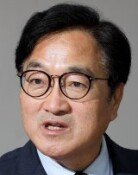[O-Ed] End Discrimination Against Foreigners
[O-Ed] End Discrimination Against Foreigners
Posted October. 31, 2009 08:23,
The 8th World Korean Business Convention that ended Thursday was attended by some 3,500 ethnic Korean businessmen from 40 countries. They discussed with domestic counterparts raising South Koreas international competitiveness. Seventy-nine export contracts worth 73.7 million U.S. dollars were also concluded, the largest in the events history. The convention provided a venue for ethnic Korean businessmen to share their experiences and knowledge gained through difficulty abroad.
The number of foreign residents in South Korea is no less than that of ethnic Koreans living abroad. A survey conducted by the Public Administration and Security Ministry said 1,106,884 expatriates lived in Korea as of May, up 24 percent from last year. In September, 265 international flights either landed at or took off from Incheon International Airport every day. By contrast, one or two international flights operate daily at Sunan Airport in the North Korean capital of Pyongyang. While the North has degenerated into one of the poorest countries in the world, the South is the worlds 13th-largest economy in no small part due to its openness.
People in South Korea, however, are not as open to foreigners as their economy is to the world. A poll of 3,547 expats conducted by World Research at the request of the Justice Ministry said 66.9 percent of those who obtained Korean citizenship believe Korean society discriminates against foreigners. A prime example is the ill treatment an Indian professor got while riding a bus last month. A drunk Korean man insulted him, saying, Youre dirty and smell, and was later indicted for defamation.
Lawmaker Jun Byung-hun of the main opposition Democratic Party has submitted a bill banning racial discrimination to the National Assembly. A single law cannot solve all problems, however. It is selfish for South Korea to want other countries to treat ethnic Koreans equally while discriminating against expatriates in the South. The countrys international standing will rise when the people treat foreigners equally regardless of nationality, race and profession.
Editorial Writer Park Seong-won (swpark@donga.com)







